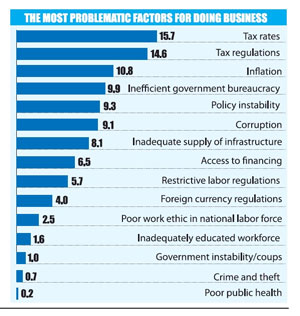07 Sep 2012 - {{hitsCtrl.values.hits}}
 Tax rates have been identified as the most problematic factor for doing business in Sri Lanka with tax regulations following closely, the findings of the latest Global Competitiveness Report (GCR) by World Economic Forum showed.
Tax rates have been identified as the most problematic factor for doing business in Sri Lanka with tax regulations following closely, the findings of the latest Global Competitiveness Report (GCR) by World Economic Forum showed. For example the tax revenue during January to May 2012 (after the introduction of tax reforms) increased only 11.9 percent in comparison to a 23.76 percent increase during the period from January to May in 2011. The tax reforms were introduced in April. 2011.
For example the tax revenue during January to May 2012 (after the introduction of tax reforms) increased only 11.9 percent in comparison to a 23.76 percent increase during the period from January to May in 2011. The tax reforms were introduced in April. 2011.
03 Jan 2025 7 hours ago
03 Jan 2025 7 hours ago
03 Jan 2025 9 hours ago
03 Jan 2025 9 hours ago
03 Jan 2025 03 Jan 2025